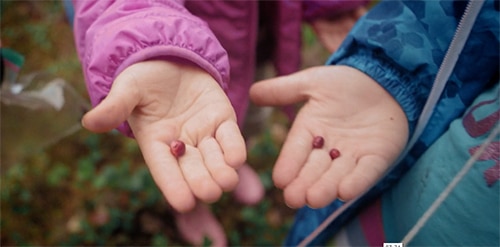A ten year journey in a millennia-old food tradition may seem like a blip in time but for Shelly Crack and her collaborators, this has been a significant decade of rebuilding local food systems in schools, strengthening human networks, and promoting traditional knowledge of land and food on the islands known as Haida Gwaii – an archipelago on BC’s north coast.
In a context where ferry costs contribute to food costing three times as much on Haida Gwaii than other parts of the province, stewarding access to traditional foodways is a crucial community effort. What is now emerging after so many years of school-focused work is a cascading ripple effect with impacts beyond the school system.
Traditional knowledge has informed the very successful farm-to-school programs on Haida Gwaii. Many of these stories are beautifully chronicled in the film Local Foods to Schools: Reconnecting the Children of Haida Gwaii to Their Food and Their Land, and this article from Farm to Cafeteria Canada which highlight new procurement relationships with farmers, fishers, and hunters; paid coordination for local food pantries; and, a practice of convening learning circles, among other glowing examples.
Shelly points to how traditional knowledge is shared in innovative governance arrangements emerging out of the farm-to-school efforts. The school food learning circles of 2013-2014 brought together farmers, teachers, Haida elders, berry pickers, chefs, and knowledge keepers for full days of visioning and goal-setting. The learning circles are now acting more as a ‘board of directors’ for Haida Gwaii’s food systems. Shelly explains:
“The learning circles really changed the conversation from farm-toschool to local food and all the abundance of Haida Gwaii and all the connections to Haida traditional food. It needed to move in this direction.”
In 2015, funding from a newly established fund from Northern Health, the Partnering for Healthier Communities (P4HC) led to the formation of the Masset in Motion committee for the community of Masset in northern Haida Gwaii. This committee includes the mayor of Masset and the head of the local hospital as well as Haida elders and knowledge keepers, farmers, parents, and Shelly as a Northern Health representative.
This group has garnered institutional and policy support for working with hunters to serve game meat in schools. Successes in school food procurement enabled Northern Health to develop a policy that supports a monthly local traditional meal in Masset’s hospital. Shelly also praises a changing policy landscape and mindset within Environmental Health, “Over the years the whole environmental health program has shifted. “They’re fully on board, for example, helping us to create food safe plans for local berries and game meat for kids to eat in schools.”
One of the most profound outcomes of the school food work has been some deeply transformational learning and connections through a national network of Indigenous school food projects. Shelly reflects on the conversation among participants at a gathering in Hazelton, BC:
“The conversation shifted to truth and reconciliation, the impact of residential schools, conservation of our food, saving our fish. A lot of people’s stories of going to residential schools are about farming or having to process food while they were starved or forced fed and deprived of traditional food. We are becoming aware that we are touching on trauma for people with our programs and we don’t yet have a strategy for how to deal with that. Being in Hazelton and listening for two days to the stories of all those communities was heart changing for me. I sat for 10 years doing counselling on food and nutrition in my community but the conversations in Hazelton felt different. I realized we are touching on something deeper here.”
This experience offered Shelly pause to reflect on what the future of the work on Haida Gwaii will be. It is clear that reconciliation and healing are needed for traditional knowledge to continue to thrive and be passed on, but, how to get there? What does it mean to do school food and broader food systems work in a context of ongoing trauma? Colonialism? Residential school survivorship? A history of food used as a weapon?
Shelly is definitive that listening to, learning, and taking direction from the Haida people and traditional knowledge is key, “With more Haida leadership we could keep going in a good way with our momentum and connections,” she notions at creating sustainable systems for local food that can live on without involvement from Northern Health. It took ten years to get here and so Shelly is not rushed, “It’s going to take us another decade to understand that vision of where we want to be.”





